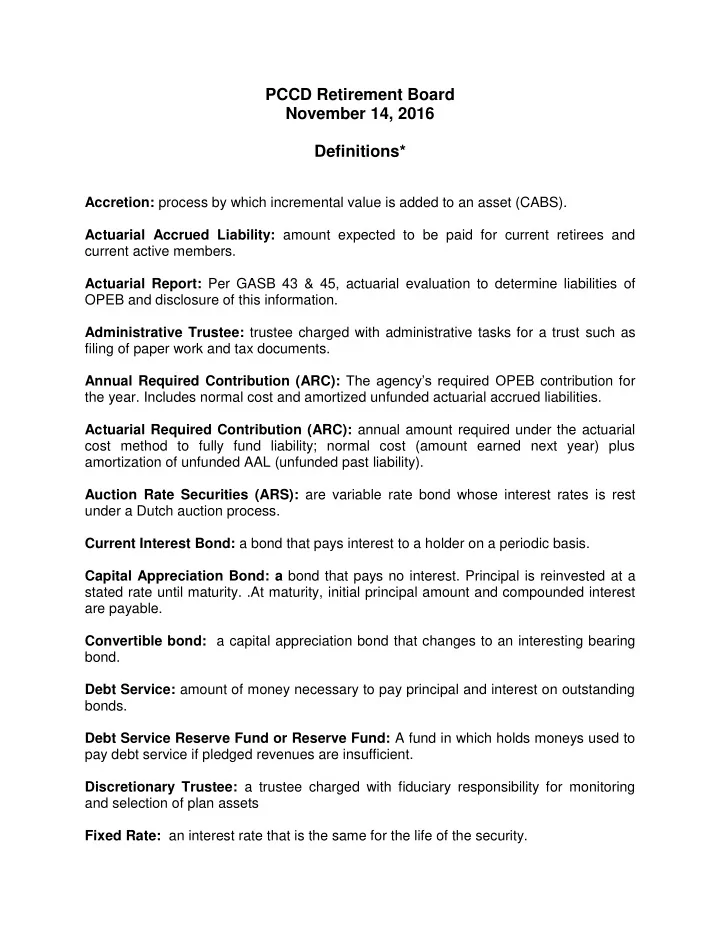

PCCD Retirement Board November 14, 2016 Definitions* Accretion: process by which incremental value is added to an asset (CABS). Actuarial Accrued Liability: amount expected to be paid for current retirees and current active members. Actuarial Report: Per GASB 43 & 45, actuarial evaluation to determine liabilities of OPEB and disclosure of this information. Administrative Trustee: trustee charged with administrative tasks for a trust such as filing of paper work and tax documents. Annual Required Contribution (ARC): The agency’s required O PEB contribution for the year. Includes normal cost and amortized unfunded actuarial accrued liabilities. Actuarial Required Contribution (ARC): annual amount required under the actuarial cost method to fully fund liability; normal cost (amount earned next year) plus amortization of unfunded AAL (unfunded past liability). Auction Rate Securities (ARS): are variable rate bond whose interest rates is rest under a Dutch auction process. Current Interest Bond: a bond that pays interest to a holder on a periodic basis. Capital Appreciation Bond: a bond that pays no interest. Principal is reinvested at a stated rate until maturity. .At maturity, initial principal amount and compounded interest are payable. Convertible bond: a capital appreciation bond that changes to an interesting bearing bond. Debt Service: amount of money necessary to pay principal and interest on outstanding bonds. Debt Service Reserve Fund or Reserve Fund: A fund in which holds moneys used to pay debt service if pledged revenues are insufficient. Discretionary Trustee: a trustee charged with fiduciary responsibility for monitoring and selection of plan assets Fixed Rate: an interest rate that is the same for the life of the security.
Fixed Income Security: a bond that has a fixed coupon and set of debt service payments. GASB 43 & 45: accounting and financial reporting provisions requiring government employers to measure and report liabilities associated with OEPB. Recognize cost of benefits in period when services received, actuarial liabilities for promised benefits, information for assessing demands on future cash flows. Sets reporting standards and methodology. GASB 74 & 75: released in June 2015 fundamental overhaul of accounting standards and financial reporting or OPEB, replacing GASB 43, 45. Require a NOL to be recognized on the balance sheet of the plan and the participating employers. Irrevocable Trust: a trust that cannot be modified or terminated. Grantor loses ownership of assets. Liquidity: the ability of to convert a security into cash. Liquidity facility: is a financial instrument such as a letter of credit, a standby bond purchase agreement or other agreement used to provide liquidity purchase securities have been tendered but cannot be immediately remarketed to new investors. The provider of the liquidity facility purchases the securities until they can be remarketed. Net OPEB Obligation (NOO): cumulative difference between annual OPEB cost and actual employer contributions. Non-Proprietary Investment: mutual fund insured by a firm other than the one that holds your account. Other Post-Employment Benefits: Non-pension post-employment benefits earned by employees Proprietary Investment: a house brand mutual fund created when a bank/brokerage firm distributes the fund and is also the investment advisor for the fund. Registered Investment Advisor: an advisor or firm engaged in investment advisory business and registered with the SEC. The Investment Advisers Act of 1940 defines as a "person or firm that, for compensation, is engaged in the act of providing advice, making recommendations, issuing reports or furnishing analyses on securities, either directly or through publications." Remarketing: The process of reselling securities that have been tendered or given back to a representative of the seller by previous owners Revocable Trust: a trust that can be modified and terminated.
Sinking Fund: A fund into which an issuer makes deposits to redeem securities for timely availability of funds to pay debt service. SWAP: a derivative contract through with two parties exchange financial instruments. Exchange of cash flows usually based on one being fixed and the other being variable. If interest rates have risen, the fixed counterparty makes payment to the floating, i.e. the floating counterparty is the winner. The reverse is true for falling interest rates. Termination Fee: the amount exchanged between the two swap parties that represents the net present value of the remaining netted cash flows. Unfunded Actuarial Accrued Liability: The difference between the actuarial accrued liability and the actuarial value of assets accumulated to finance that obligation. Validation: A procedure whereby the legality of a proposed issuance of securities is determined, often through a court proceeding, in advance of the issuance of the bonds. Actuarial Study Variable Rate: An interest rate on a security changes at intervals according to a predetermined index or formula. Variable Rate Demand Obligations (VRDO) for Variable Rate Bond: a bond with a floating coupon (changes) that are adjusted at specific intervals. *References from MSRB, SIFMA, Moody’s Municipal Guide
Recommend
More recommend